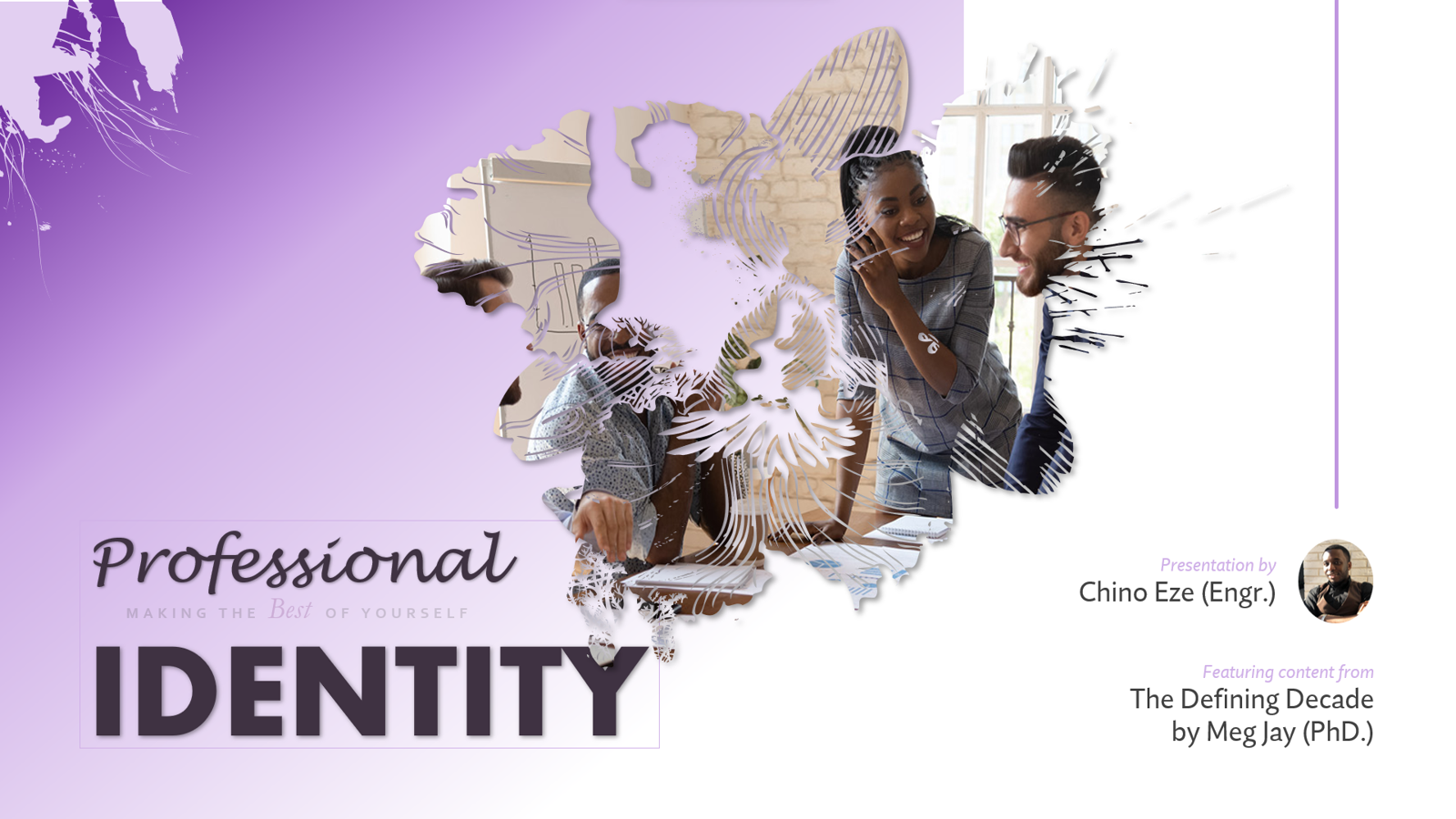Professional Identity – Making the Best of Yourself

This presentation is divided into the following discussion points:
- Positive Habits
- Benefits of developing good habits
- The Enemy of Good
- Sticking with the good while waiting for the best
- Identity Crisis vs. Identity Capital
- As you discover yourself, build your unique identity
- Power of Forward Thinking
- The brain, like any muscle in the body, gets stronger through regular exercise
- Urban Tribe–False Comfort
- Helps you survive, but doesn’t help you thrive

The habits you practice appear to make no difference for a while, then suddenly, a new level of performance is unlocked…the early stages can be discouraging but note that…the most powerful outcomes are delayed.
You might not achieve something legendary or historic, but by developing good habits, you can accomplish something rare and reach your full potential.
1. Positive Habits

Definition – What is a Habit?
A habit can be defined as a routine that is performed regularly–and, in many cases, automatically.
Positive Habits to Form
The following are examples of good habits to form:
- Waking up early
- Keeping your environment (room) clean and decent (being organized) – Your room is an externalization of your mind. Your environment is often a reflection of your state of mind and it is possible to influence your state of mind by controlling your environment. This is the power of organizing your environment.
- Having a healthy diet
- Exercising regularly
- Developing your mind (read, listen to educative podcasts, etc.)
- Keeping a journal – If you write things down for six months of your life, at the end of those six months you won’t have the intelligence of one moment but you would have the accumulated intelligence of six months. Start writing down your life—it is the most valuable resource you have.

Benefits of Developing Positive (Good) Habits
- We don’t really care for the habits we form early in our lives because we don’t often see the immediate effects.
- The older we get, the more set we become in our ways and the harder it is to cultivate new habits.
Consistency
- Find the motivation to do something again and again till it becomes a habit.
- Develop self-discipline
- Remember to go easy on yourself – You might fail but your ability to keep going is what makes you become a disciplined person.
The best time to start is now.
“Discipline yourself in small things, and from there, progress to things of greater value.”
—MARCUS AURELIUS

Don’t fear failure–everyone fails, but our failures can equip us for future success. The true failure is the person who fails to learn from setbacks.
“It is defeat that turns bone to flint and gristle to muscle, and makes people invincible, and forms those heroic natures that are now ascendancy in the world. Do not, then, be afraid of defeat. You are never so near to victory as when defeated in a good cause.”
–HENRY WARD BEECHER
2. The Enemy of GOOD

Sticking with the GOOD while waiting for the BEST
- When we attempt to make the perfect decision, we can often become stuck in indecision, or hopping from one thing to another.
- Thus, postponing tough decisions about life doesn’t make them easier; time only makes decision-making tougher because you have less time to decide.
- Doing something later doesn’t necessarily mean doing it better.
- Give your new habit (or new skill) time to work instead of jumping from one to another when you are disappointed by setbacks.

With so much going on in the world today (buoyed by the easy access to information), distractions abound and vie for our attention. Thus, we are distracted from making important decisions. Society bombards us with a kaleidoscope of distractions, from the constant influx of notifications on our smartphones, to the mind-numbing entertainment of social media.
The result is a culture of instant gratification that encourages us to seek immediate pleasures at the expense of the painstaking and time-consuming, but rewarding, task of personal development. So, we are stuck in a rabbit hole rather than engaging in thoughtful contemplation and decision-making.
Furthermore, the pressure to conform to societal expectations also diverts our focus and keeps us preoccupied with meeting external demands. The pressure to fit in, succeed, and maintain an image eclipses the ability to prioritize and make decisions that align with our true values and aspirations.

Your identity is shaped by your values: and when you know your values, making decisions is considerably easier.
3. IDENTITY: Capital vs. Crisis

Definition – Identity Crisis
Identity crisis can be defined a period of uncertainty and confusion in which an individual’s sense of identity becomes unstable or insecure.
Identity insecurity could be caused by:
- A transition from one stage of life to another
- A life-changing experience
- A change in societal expectations

Definition – Identity Capital
Identity capital is the collection of personal assets. It is the repertoire of individual resources you assemble over time.
They are things that you’ve done long enough and are good enough in. Such things would go on your résumé.
Examples of identity capital:
- Volunteer work
- Skills
- Degrees (on-line courses)
- Job (side-hustles) and life experiences
Identity capital becomes the currency you use to get jobs and build relationships.
Your identity capital can become what you are known for (a notable project) and gain you some attention till you do something significant in your career.

As you Discover yourself, Build your Unique Identity
- As you go through identity crisis, build your identity capital—the qualities that define you.
- There must be a balance between the two; more of either is unhealthy.
- Things to consider when working on your identity capital:
- Constructing a reasonable story about your past, present, and future.
- How what you’ve done relates to what you want to do now and what you want to do in the future.
- Being careful about taking jobs that would hurt your identity capital.
It is okay to be motivated to tweak your actions by others on the same path, but don’t get carried away trying to copy them—it might not work for you.
If you are forced to pick a job that’s lower than your qualification, choose the job that adds more to your identity capital.

4. The Power of Forward Thinking

Definition – What is Forward Thinking?
Forward thinking refers to:
- How you think and act even (and especially) in uncertain situations (i.e., the future).
- Forward thinking helps you turn abstract goals into concrete steps to reach said goals.
The brain, like any muscle in the body, gets stronger through Regular Exercise
The intelligence needed to thrive in school is different from the one needed to thrive in the real world.
- School intelligence deals with solving problems with clear answers and defined time limits.
- Intelligence in the real world helps us make decisions when there are adult dilemmas—problems that don’t have “right answers”.

The front of the brain (responsible for forward thinking) is the last to develop.
- Because of this, younger people have a harder time planning for the future.
However, getting better at forward thinking takes practice and experience. Thus, the earlier you start, the better.
“The more you use your brain, the more brain you will have to use.”
—GEORGE A. DORSEY

5. Urban Tribe–False Comfort

Definition – The Urban Tribe
The Urban Tribe can be defined as like-minded peers with whom you spend a bulk of your free time with.
Characteristics of the Urban Tribe
Your urban tribe consists of people with whom you have…
- Strong ties
- A lot in common
- Shared experiences and assumptions
- Same lingo
Your urban tribe often includes:
- Close friends
- Roommates
- Partners
- Work colleagues

The following is a contrast between the Urban Tribe (people you have Strong Ties with) and Weak Ties.
Urban Tribe
- People with whom you have a sense of belonging–they keep you grounded emotionally and socially.
- They usually have little to offer you professionally.
- Out of concern (being overly concerned), they often hold you back from facing the unknown.
- As a result of being in the same circle, people in your Urban Tribe generally provide you with the same information and regularly, the same perspective. Thus, you are limited having a narrow view of things.
Weak Ties
- People you have weak ties with force you out of your comfort zone (in reasoning and dialogue). Because they are not in the same circle as you are, you have to be more eloquent when you express yourself to people with whom you have weak ties.
- Your network of weak ties is often where you’ll get your job opportunities from.
- Your weak ties promote and even force thoughtful growth.
- Weak ties usually bring dramatic changes (often the source of life-changing information).


